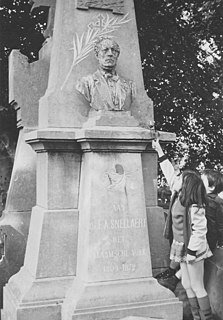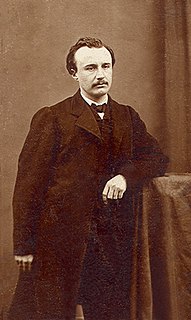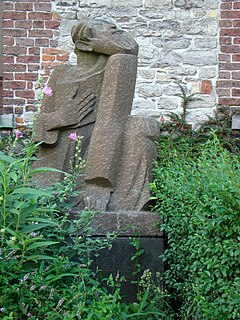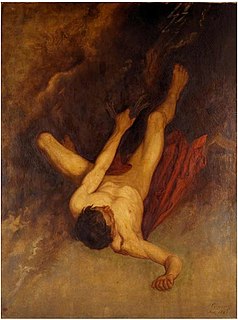
Flanders is the Flemish-speaking northern portion of Belgium and one of the communities, regions and language areas of Belgium. However, there are several overlapping definitions, including ones related to culture, language, politics, and history, and sometimes involving neighbouring countries. The demonym associated with Flanders is Fleming, while the corresponding adjective is Flemish. The official capital of Flanders is the City of Brussels, although the Brussels-Capital Region has an independent regional government. The powers of the government of Flanders consist, among others, of economic affairs in the Flemish Region and the community aspects of Flanders life in Brussels, such as Flemish culture and education.

Groen, founded as Agalev, is a green Flemish political party in Belgium. Its French-speaking equivalent is Ecolo; the two parties maintain close relations with each other.

The Flemish Movement is an umbrella term which encompasses various political groups in the Belgian region of Flanders and, less commonly, in French Flanders. Ideologically, it encompasses groups which have sought to promote Flemish culture and Dutch language as well as those who have sought greater political autonomy for Flanders within Belgium. It also encompasses nationalists who have sought the secession of Flanders from Belgium, either through outright independence or unification with the Netherlands.

Greater Netherlands is an irredentist concept which unites the Netherlands, Flanders, and sometimes including Brussels. Additionally, a Greater Netherlands state may include the annexation of the French Westhoek, Suriname, formerly Dutch-speaking areas of Germany and France, or even the ethnically Dutch and/or Afrikaans-speaking parts of South Africa, though such variants are mostly limited to far-right groups. A related proposal is the Pan-Netherlands concept, which includes Wallonia and potentially also Luxembourg.

Het Laatste Nieuws is a Dutch-language newspaper based in Antwerp, Belgium. It was founded by Julius Hoste Sr. on 7 June 1888. It is now part of DPG Media, and is the most popular newspaper in Flanders and Belgium.
Flemish literature is literature from Flanders, historically a region comprising parts of present-day Belgium, France and the Netherlands. Until the early 19th century, this literature was regarded as an integral part of Dutch literature. After Belgium became independent from the Netherlands in 1830, the term Flemish literature acquired a narrower meaning and refers to the Dutch-language literature produced in Belgium. It remains a part of Dutch-language literature.
The Willemsfonds, named after Jan Frans Willems, is a non-profit cultural organisation founded in the 19th century to promote Flemish culture and language in Belgium. In order to achieve this goal, the organisation encouraged Flemish folk song, organised linguistic games and published inexpensive Flemish books. In addition, the organisation established general libraries.

Ferdinand Augustijn Snellaert was a Flemish writer.

Julius Vuylsteke was a Belgian liberal politician and writer. He started his career as a lawyer, but later opened a bookshop. As a liberal Flemish politician, he founded the liberal association 't zal wel gaan, and he played an important role in the Flemish movement. Julius Vuylsteke promoted cultural cooperation of Flanders with the Netherlands. He became President of the Willemsfonds, and after his political career he gave his attention mainly to the history of Flanders. In 1867, he founded the Flemish weekly Het Volksbelang, which appeared for the first time on 12 January 1867. In 1867, Julius De Vigne was one of the editors together with Julius Sabbe, Jozef Van Hoorde, and Adolf Hoste.
Julius De Vigne was a Belgian lawyer, politician and writer. He studied law at the University of Ghent and established himself as a lawyer. For several years, he was a member of the provincial - and municipal Council of Ghent. As a student at the university, he contributed to the student almanacs, published by the Flemish literary student organization 't zal wel gaan. When the Flemish weekly Het Volksbelang was founded by Julius Vuylsteke, in 1867, he was one of the editors together with Julius Sabbe, Jozef Van Hoorde, and Adolf Hoste.
Adolphe Joseph Hoste was a publisher in Ghent in the 19th century. Although he belonged to the French-speaking bourgeoisie, he was an early supporter of Flemish literature. He notably published much Flemish avant garde, such as Anton Bergmann and Novellen of Rosalie and Virginie Loveling. When the Flemish weekly Het Volksbelang was founded by Julius Vuylsteke, in 1867, he was one of the editors together with Julius Sabbe, Jozef Van Hoorde, and Julius De Vigne.

Joris Van Severen was a Belgian politician and ideologue of the Flemish Movement as well as a Pan-Netherlander. A leading figure of pre-World War II Flemish nationalism, he co-founded the extreme-right group Verdinaso.

Paul Fredericq was a Belgian historian at Ghent University active in the promotion of the use of the Dutch language in Belgium.

Anton Bergmann was a Belgian writer and a liberal Flemish activist. Already during his youth he was fond of Dutch literature, and together with Julius Vuylsteke, he was a member of 't zal wel gaan, a Flemish cultural and liberal organization. After he graduated from humaniora, he went to the University of Ghent, where he obtained a bachelor's degree in literature, law and notary. Afterwards he attended the Vrije Hogeschool van Brussel, where he obtained a doctorate in law in 1858. In the meantime he was very active as a writer and as an historian. He wrote a study on Philips van Marnix van Sint Aldegonde, plundering der hoofdkerk van Lier. A Royal Decree of 17 June 1857 awarded to Anton Bergmann the five-year price of Dutch literatur for the period 1870–1874.
The Frontpartij was a Belgian political party that campaigned for increasing recognition for the Flemish people and their language. Originating from the earlier Frontbeweging, the Frontpartij was an early attempt to fully politicise the Flemish Movement. In contrast to some of its successor movements the party supported democracy and autonomy rather than authoritarianism and independence.

René De Clercq, born René Desiderius Declercq, was a Flemish-Dutch political activist, writer, poet, and composer.

Adolphe Pierre Sunaert, Adolphe Sunaert or Adolf Sunaert was a Belgian painter, printmaker, teacher and author. He played a role in the organization and conservation of the art collections of the city of Ghent.

The siege of Ghent during the Eighty Years' War by Spanish general Alexander Farnese, Prince of Parma, lasted from October 1583 to 17 September 1584. It was the end phase of the so-called Calvinist Republic of Ghent, which had controlled most of the County of Flanders since radical Protestants seized power on 28 October 1577, claiming a leading role for the city of Ghent in the struggle against the Spanish royal forces and Malcontent Catholics.

Dries Van Langenhove is a Belgian politician. Since 2017, he is the founder and leader of the right-wing, Flemish nationalist youth organization Schild & Vrienden, which has been described as far-right. In 2019, he was elected to the Chamber of Representatives on the Vlaams Belang ticket despite not being a registered member of the party.

Pan-Netherlands, sometimes translated as Whole-Netherlands, is an irredentist concept which aims to unite the Low Countries into a single state. It is an example of Pan-Nationalism.















